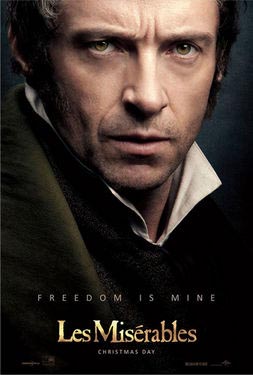 Musicals affect me something like dry martinis. The more I consume, the weaker my inhibitions become. In the end, against my critical instincts and even my good sense, I succumb. I cave in. I cry. Which is what I did starting with the very first note of “I Dreamed a Dream,” all the way to the death of Jean Valjean—a death saturated in religious iconography, grieving children, and fairytale closure. An end, in short, worthy of anything by Verdi.
Musicals affect me something like dry martinis. The more I consume, the weaker my inhibitions become. In the end, against my critical instincts and even my good sense, I succumb. I cave in. I cry. Which is what I did starting with the very first note of “I Dreamed a Dream,” all the way to the death of Jean Valjean—a death saturated in religious iconography, grieving children, and fairytale closure. An end, in short, worthy of anything by Verdi.
In fact it’s probably a good idea to stow away any preconceptions you have about stage musicals—the kind that involve dialogue, a big musical number, and more dialogue. If you think of director Tom Hooper’s ambitious screen version of Les Misérables (loosely based upon the multi-volume epic by Victor Hugo) as something of an opera, you’ll gain enough emotional traction to use up half a box of Kleenex before the credits roll.
By now everyone with a computer or TV knows that Oscar-winner Hooper (The King’s Speech) decided to venture into dicey territory and have his actors actually perform their own singing. On screen.
No dubbed voice-over, no professional singers creating the vocals in studios and then layering their voices atop the screen performances. Nope. There was Hugh Jackman singing with passionate conviction in a range much higher than his comfort zone. And Anne Hathaway, weeping, trembling and raging her waythrough the über tear-jerker “I Dreamed a Dream.” Even poor, puffy Russell Crowe (who, we are told, was once upon a time a rock singer) shows up and gives it his all as the villainous Javert, hounding ValJean whose youthful offense was stealing a loaf of bread to feed his starving family.
What this directorial gamble succeeds in giving the audience is a 2 1/2 hour spectacle that is emotionally honest, dare I say authentic? Even with its many flaws and moments of tone deaf editing, Les Misérables believes in its own magic. And the result is that more often than not, so do we.
Jackman is more talented than any ten men who can act, sing, dance, and look terrific, and his Valjean is poignant and heroic. But the moment that took my breath away was Hathaway finding the full spectrum of rage, loss, and regret through a song that has become a media cliché. In her hands, it was a timeless moment of great acting. And if Oscars could be given for just one long, musical confession it would belong to her.
Sure there’s a lot to roll the eyes over. And the whole pumped up froth of handsome young men attempting something like a revolution in the early 1800s, doesn’t ever catch emotional fire. Probably it would help to be French. Russell Crowe ruminating over the rooftops of Paris is a stretch and a half, as is the curiously underpopulated crowd scene in which our young rebels attempt to work our emotions to a fever pitch. But think of it as opera, with all of the impossible plot turns and coincidences, the last minute salvations, and just desserts that make Mozart and Verdi so irresistible, and you’ll enjoy the joyful moments of catharsis this huge, sweeping spectacle has to offer.


“Musicals affect me something like dry martinis. The more I consume, the weaker my inhibitions become.”
So I guess you would be in big trouble (or have a a hell of a good time!) if you watched a bunch of musicals around
Christmas time?
“Christmas Film Orgy! 27 December 2012”